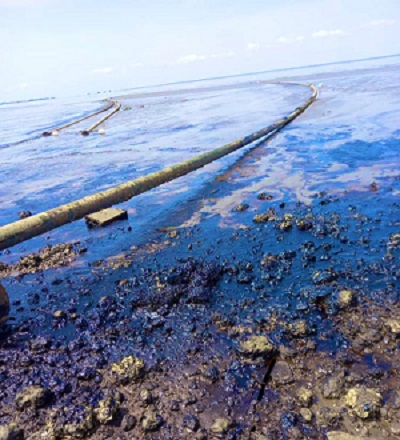By: Alieu Jallow
Victims of the 2022 Mandinaring oil spill have accused authorities of disregarding and failing to compensate them for the significant damages incurred.
In May 2022, a pipeline rupture caused the main fuel depot in Mandinaring, Kombo North, in The Gambia, to spill over 70 metric tonnes of Heavy Fuel Oil (HFO) into the river and surrounding areas. The spill spread across the riverbanks of the Gambia and reached as far as Pirang in the Kombo East district.
Even with the implementation of modern safety regulations, the depot remains a source of danger for nearby residents, particularly children. The dangers include ground-level ozone from gasoline fumes and potential groundwater contamination from petroleum products leaking into the soil.
The coastal village of Mandinaring is a vital economic hub and a breeding ground for numerous fish species. Banjul’s fuel storage capacity is limited, which led the government to establish new fuel storage in the village on May 24th, 2008.
Alasan Pam, a fisherman and victim, expressed his frustration over the lack of support and protection from those who are supposed to provide it. He stated that these individuals are suppressing and destroying their property without compensation. Mr. Pam also mentioned that he and other fishermen had a meeting with Gam Petroleum to discuss compensation for the damages, but unfortunately, the meeting was unsuccessful.
Alluding to what his colleague Alasan revealed, Mamadou Pam explained that for a week they were unable to access their fishing boat and materials due to the toxic and flammable nature of the water. This made life unbearable for their poor families, as their survival depended on how much catch they could get from the river.
Mustapha Ceesay, an elderly man, mentioned how inhaling spills’ scent can lead to respiratory diseases, forcing them to get checkups.
Mr Ceesay further revealed that providing for their family was extremely challenging during the spills and clean-ups.
“In the past, one [fishing] net used to catch up to 10 kilos of scrimps, but now 7 [fishing] nets combined can’t catch such a quantity,” Ceesay said.
Musa Pam emphasized that they are tax-compliant and pay their yearly dues to the maritime department. However, they have never received any government support and allege being used as a tool to gather funds, saying: “Government failed to turn up since the last visit”.
Isatou Secka, a fishmonger, spoke on behalf of women affected by the oil spills. She explained how the oil spills rendered many husbands unable to provide for their families, causing women to take on unfamiliar work.
“We are forced to leave our houses at around 5 a.m. and head to Tanji or Banjul to get fish to sell and later return home to head to our vegetable gardens,” Secka said.
In the far north along the riverbank, women oyster farmers in Kubuneh are being forced to abandon their only source of income due to riverbank spills.
Jariatou Gibba decried of challenges meeting family demands and paying their children’s school fees.
“Our oysters smell and [get] sticky and [they] can’t last for two days, thus [we] find it hard to sell in the market in order to pay our children’s school fees,” she said.
Many women echoed the same sentiment, calling for support from authorities and philanthropists due to the devastating impact of oil spills on their lives and livelihoods.
The Fatu Network could not reach both the Petroleum Ministry and the Ministry of Environment and Climate Change for comments.




